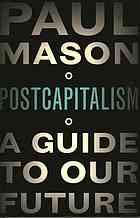
Postcapitalism
A Guide to Our Future
کتاب های مرتبط
- اطلاعات
- نقد و بررسی
- دیدگاه کاربران
نقد و بررسی

December 14, 2015
Mason, economics editor for Britain’s Channel 4 News, predicts that a new economic order will rise from the ashes of neoliberal capitalism, and that it will involve a new, digital-savvy, independent-minded workforce motivated by rewards other than money. Already, this new world is appearing—but Mason explains that it has been stalled by neoliberals intent on perpetuating the status quo. At first, Mason’s ideas may appear hopelessly unrealistic and utopian. Yet his passion is so contagious, his prose so absorbing, and his thoughts so intriguing that the reader is soon swept up in his enthusiasm. Parts I and II of the book comprise a fascinating review of the history of economic thought. Part III (where Mason’s credibility declines sharply) describes how we might transition peacefully from capitalism to a new age, one ideally featuring very limited global warming, greatly increased prosperity, and work becoming voluntary. How this is to be practically achieved is scarcely explained; Mason merely observes that weathering digital-era disruptions should be easy compared to, for example, the seismic shift in gender roles effected by contraceptive pills. Nonetheless, this book’s vision for the future, even if unlikely, is absorbing and provocative.

November 15, 2015
Capitalism, writes a British journalist/broadcaster, verges now on self-destruction, and he forecasts an economic future quite unlike any we've known.Predicting the end of capitalism is a game at least as old as Karl Marx, but Mason (Why It's Still Kicking Off Everywhere: The New Global Revolutions, 2012, etc.) reminds us that this socio-economic system has not always been with us and, despite its remarkable adaptability, carries with it no guarantee of perpetuity. Old arrangements that ordered the feudal era, after all, collapsed, and something similar may be happening today, requiring us to abandon accepted notions about markets, supply and demand, property ownership and exchange, and "the old relationship between wages, work, and profit." From a forthrightly leftist perspective, Mason analyzes the external forces--principally income inequality and climate change--and the internal contradictions eroding capitalism as we know it. These he traces to information technology, an unprecedented development that reduces the need for work, corrodes market mechanisms accustomed to scarcity rather than abundance, and features collaborative production of goods and services. The transformation to post-capitalism, he writes, will not be led by the old-model, industrial-laboring class but rather midwifed by the "values, voices, and morals" of a networked generation, connected people who today operate in the interstices of the current system and who tomorrow will replace it. Even readers not quite persuaded will appreciate Mason's readable, reportorial style, his use of a wide range of economists, business gurus, and economic thinkers to help support his thesis, and his deft treatment of sometimes-difficult economic theories. He's especially good on the Stalin-era "wave-theory" economist Nikolai Kondratieff, and he shines an eye-opening light on Marx's 1858 Fragment on Machines (unpublished in English till 1973), which hints at a "route out of capitalism" similar to Mason's own. A radical diagnosis and a bold prognostication bound to energize progressives.
COPYRIGHT(2015) Kirkus Reviews, ALL RIGHTS RESERVED.

January 1, 2016
British economics journalist Mason (Why It's Kicking Off Everywhere) thinks that information technology is creating such vast changes that the capitalist system can't adapt and is therefore ripe for replacement. He argues that information technology tends "to dissolve markets, destroy ownership and break down the relationship between work and wages" and that the transition to postcapitalism, if it is to take place, needs to be based upon experimentation, collaboration, and arbitration rather than the Soviet-style command and control. Mason even describes "the emergence of a new kind of human being." In arguing for these large claims, which are made with an air of total assurance, the author utilizes various analytical tools such as the labor theory of value and Nikolai Kondratieff's "long wave theory," though he is not averse to modifying those frameworks. Despite Mason's preemptive protests, it is easy to regard the book as an exercise in technoutopianism. Readers unconvinced by the arguments may still find the discussion of certain aspects of the history of economic thought to be of interest. VERDICT This prolix, sophisticated work is most likely to appeal to those with a developed taste for speculating about the future. [See Prepub Alert, 8/24/15.]--Shmuel Ben-Gad, Gelman Lib., George Washington Univ., Washington, DC
Copyright 2016 Library Journal, LLC Used with permission.

September 15, 2015
The award-winning economics editor of Britain's Channel 4 News, Mason looks at the current economic earthquake and predicts that capitalism as we know it will vanish, driven out by the prevailing information (-wants-to-be-free) technology, which has effectively undermined markets, wages, and private ownership. The result, he argues, will be a more equitable and sustainable type of economy.
Copyright 2015 Library Journal, LLC Used with permission.

























دیدگاه کاربران